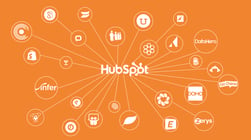Index Content
want to have the best of two tools combined in one place?
HubSpot is one of the most popular tools in the marketing and sales world because it offers full functionality and guaranteed results. But one of the great things about this application is that it gives you options.
With HubSpot's software you can connect your favourite tools with HubSpot and combine the best features of two separate platforms in one place, so if you are already a HubSpot customer and want to install a new application to improve your company's services, you can do so by integrating both platforms into one.
exactly which platforms can you integrate with HubSpot? The options are plentiful, so we've put together a list of the best HubSpot integrations for your ecommerce.
So you can discover the best of HubSpot integrations in a quick and easy way.
will you join us?
what are HubSpot integrations?
HubSpot is a tool that allows content management (CMS) and customer relationship management (CRM). To complete these tasks in a simple and practical way, HubSpot allows you to integrate other software or applications. These are basically HubSpot integrations, which consist of adding functionalities to the website that facilitate both content management and customer management, and ensure that everything is connected.
Sales integrations help companies bring together their sales tools, tactics and lead information using HubSpot, so they can keep their marketing, support and sales details in one central location for all teams to access, analyse and query as they see fit.
Put simply, a HubSpot integration is the addition of functionality from another software or application to the HubSpot platform to facilitate an organisation 's content management, customer relationship management and internal processes. The latter varies depending on the type of integration being undertaken.
how can HubSpot integrations help your ecommerce?
With an increasing number of competitors in the digital marketplace, ecommerce marketing has evolved beyond simply promoting products to developing personalised relationships between marketers and customers. To stand out from the crowd, businesses need to provide more value to their customers before, during and after their online shopping experience.
HubSpot can help you whether you're starting a business from scratch or accelerating your growth into a more established brand:
Attract new customers
Helps you increase traffic to your website with its world-class tools for search engine optimisation (SEO), social media monitoring and blogging.
Convert traffic into sales
More than 95% of website visitors don't make a purchase on their first visit. With HubSpot you can create and optimise product pages and e-newsletters to deliver a more compelling online shopping experience.
Personalise the remarketing process
HubSpot uses individual user data and website activity to personalise email marketing campaigns and website experiences related to abandoned cart tracking, upsell campaigns and repeat purchase marketing.
Monitor and attribute revenue
HubSpot allows you to use closed-loop reporting to track customers from their first site visit to their most recent purchase. As a result, you can generate direct attribution reports between marketing efforts and digital dollars spent.
Top 10 HubSpot integrations for ecommerce
With a clear idea of what HubSpot integrations are and how they can help your business, here's a list of the best HubSpot integrations for ecommerce:
-
Shopify
HubSpot's integration with Shopify is one of the most popular, and it works with all HubSpot plans. Incorporate inbound into your marketing strategy to generate more traffic with more organic products, build a compelling brand in the marketplace, and increase revenue from your existing customer base.
One of the most attractive features of this integration is contact segmentation and data collection, which is especially useful for redirecting your company's ecommerce strategy, expanding into new markets, or making data-driven decisions.
-
Magento
The Magento integration with HubSpot allows you to increase online sales from new customers and increase repeat purchases from existing customers. The integration transfers all your customer and online shop information to HubSpot, including:
- Order information
- Recent activity
- Browser type
- Abandoned carts
- Lifetime customer statistics
- Average order value
Integrating Magento with HubSpot allows you to nurture your company's customers and recover abandoned carts thanks to automation and data personalisation.
-
Spreadshop
The Spreadshop application for HubSpot allows sales departments to quickly and easily share all information from their marketing campaigns directly with HubSpot, so that they can then use it in all CRM activities.
This integration also facilitates the conversion rate of customers by directly sharing all the images of each ecommerce product on the different social media channels thanks to HubSpot.
-
Simle.io
HubSpot is a marketing and sales software that can help you manage your online shop. HubSpot's integration with Smile allows you to automatically synchronise rewards data to help filter contact lists in HubSpot. This makes it easy to send targeted messages to customers who have earned a specific amount of points or participate in one of your VIP levels or create many other loyalty-related segments.
-
SalesForce
The SalesForce integration with HubSpot is quite useful for connecting marketing and sales databases.
It is a cloud-based customer relationship management (CRM) platform that connects various departments such as marketing, sales, customer service and e-commerce. This allows for a much broader view of how the brand is performing and how customers are responding to each of the campaigns launched, which in turn allows you to readjust your strategy at any time for better results.
-
BigCommerce Dynamic Segments
BigCommerce Dynamic's integration with HubSpot makes it easy to automate the segmentation of your customers in your online commerce.
The main features of this segmentation are:
- Automatically assigned segments, through an analysis of customer data, customers are segmented and synchronised.
- Personalised campaign design - Tailor campaigns to each audience - this integration will tell you whether new customers may need a discount or loyal customers may need to be cross-sold.
- Increased retention and loyalty. Through event-based marketing, you tailor segments to increase the ROI of each campaign by providing value to each customer at every interaction.
-
WooCommerce Dynamic Coupons
WooCommerce Dynamic Coupons integration with HubSpot allows you to deliver personalised coupons to the right person at the right time in their customer journey, all without leaving HubSpot.
Unific Dynamics coupons are powerful on their own, but are best when combined with other e-commerce apps in the HubSpot Marketplace. Unific's sync apps will sync all shopping cart data with HubSpot in near real-time, so you can determine who gets which coupon and when.
-
Square
The Square and HubSpot integration makes it easy to sync customers without manual data entry or messy imports. The main features of this integration are as follows:
- Bi-directional synchronisation: data is shared between Square and HubSpot in real time
- Custom field mappings: You have the flexibility to create your own mappings or change the default ones
- Historical sync: your existing data will sync immediately and updates will sync as they happen.
-
Gravity Forms
Gravity Forms' integration with HubSpot allows you to create and link customer forms in HubSpot, allowing you to get a large amount of information in a short amount of time and organise and sort it seamlessly.
-
SamCart
SamCart's integration engine allows you to automatically add customers as a Contact and segment them into a list within HubSpot, freeing up time for you to focus on driving more traffic to your SamCart pages instead of manually adding data to your CRM.





